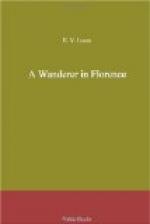Fine as the beak of a young
beccaccia
The campanile,
the Duomo’s fit ally,
Shall soar up in gold full
fifty braccia,
Completing Florence,
as Florence Italy.
But I suppose that the monologues “Andrea del Sarto” and “Fra Lippo Lippi” would be considered the finest fruit of Browning’s Florentine sojourn, as “Casa Guidi Windows” is of Mrs. Browning’s. Her great poem is indeed as passionate a plea for Italian liberty as anything by an Italian poet. Here also she wrote much if not all of “Aurora Leigh,” “The Poems before Congress,” and those other Italian political pieces which when her husband collected them as “Last Poems” he dedicated “to ‘grateful Florence’”.
In these Casa Guidi rooms the happiest days of both lives were spent, and many a time have the walls resounded to the great voice, laughing, praising or condemning, of Walter Savage Landor; while the shy Hawthorne has talked here too. Casa Guidi lodged not only the Brownings, but, at one time, Lowell, who was not, however, a very good Florentine. “As for pictures,” I find him writing, in 1874, on a later visit, “I am tired to death of ’em,... and then most of them are so bad. I like best the earlier ones, that say so much in their half-unconscious prattle, and talk nature to me instead of high art.” But “the older streets,” he says, “have a noble mediaeval distance and reserve for me—a frown I was going to call it, not of hostility, but of haughty doubt. These grim palace fronts meet you with an aristocratic start that puts you to the proof of your credentials. There is to me something wholesome in that that makes you feel your place.”
The Brownings are the two English poets who first spring to mind in connexion with Florence; but they had had very illustrious predecessors. In August and September, 1638, during the reign of Ferdinand II, John Milton was here, and again in the spring of 1639. He read Latin poems to fellow-scholars in the city and received complimentary sonnets in reply. Here he met Galileo, and from here he made the excursion to Vallombrosa which gave him some of his most famous lines. He also learned enough of the language to write love poetry to a lady in Bologna, although he is said to have offended Italians generally by his strict morality.
Skipping a hundred and eighty years we find Shelley in Florence, in 1819, and it was here that his son was born, receiving the names Percy Florence. Here he wrote, as I have said, his “Ode to the West Wind” and that grimly comic work “Peter Bell the Third”.
But next the Brownings it is Walter Savage Landor of whom I always think as the greatest English Florentine. Florence became his second home when he was middle-aged and strong; and then again, when he was a very old man, shipwrecked by his impulsive and impossible temper, it became his last haven. It was Browning who found him his final resting-place—a floor of rooms not far from where we now stand, in the Via Nunziatina.




